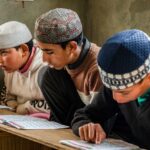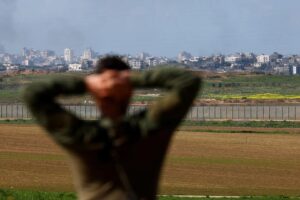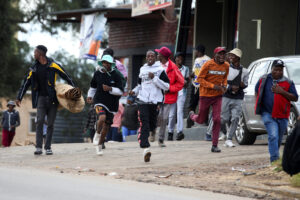In 2024, two devastating conflicts intensified: the war in Ukraine, and the escalating crisis in Gaza. In Ukraine, the conflict reshaped global alliances, with NATO reclaiming a pivotal role as Europe reexamined and bolstered its defence and security strategies. In the Middle East, the crisis in Gaza expanded to involve Lebanon, exacerbating an already dire humanitarian situation as blockades and military operations worsened civilian suffering. Both conflicts underscored the fragility of international norms, the challenges to achieving lasting resolutions, and the interplay between local grievances and broader geopolitical rivalries. Together, they emphasise the urgent need for diplomatic engagement, humanitarian relief, and sustainable frameworks for peace.
The year also marked the largest election year in modern history, with millions of people across Africa, Asia, Europe, and the Americas going to the polls to elect their representatives and leaders. In Latin America, at least six countries have voted in 2024, while in Africa, nearly 17 nations have already held or are about to hold elections at the time of writing.
In the African continent, these high-stakes elections have been accompanied by a troubling resurgence of military coups. While some nations achieved peaceful democratic transitions, others grappled with contested outcomes and coups d’état amid ongoing security crises, economic hardships, and climate challenges.
In India, home to the world’s largest electorate, the elections resulted in a broad continuity of leadership, albeit with a diminished mandate for the ruling party. In neighbouring Bangladesh, widespread post-poll protests overthrew Sheikh Hasina’s regime and upended the country’s stability. In the United Kingdom, elections ended 14 years of Conservative reign and brought the centre-left Labour Party to power. In France, the elections resulted in a closely contested outcome, leaving the ruling government with a fragile parliamentary majority and the daunting task of navigating a fragmented political landscape.
Meanwhile, Donald Trump’s decisive election victory in the United States threatens to undermine multilateral governance structures that are already under immense strain. Just as the US election results poured in, Germany’s coalition government collapsed, leaving a complex political situation that will likely take months to resolve. As the West looked on, the expanded BRICS grouping, fraught with internal divisions, held its 16th summit in October. Amid these shifts, regional actors are stepping in to reshape global governance by addressing critical gaps, both nationally and collectively. Morocco’s Atlantic initiatives and Africa’s broader cooperation schemes exemplify the rising impact of complementary frameworks in driving innovative solutions to global challenges.
Such domestic shifts will impact policymaking across the globe, in areas ranging from climate change to trade and security policy. With protectionist tendencies in vogue and the imposition of tariffs dominating the economic toolkits of nations, new leaderships are slated to recalibrate trade policies. At the same time, key global actors such as India, the US, and the EU are working to reduce their dependencies on the Chinese market. In Europe, far-right surges are impacting mainstream parties, which are tempted to adopt parts of the far-right agenda to appeal to voters, in the process potentially compromising sections of the ambitious European Green Deal. The advent of digital technologies, while increasing citizen engagement, has also exacerbated the threat of disinformation undermining elections. Meanwhile, migration remains a pivotal issue for many regions, including Europe and Africa, frequently used as a convenient scapegoat for deeper socio-economic and political challenges as countries navigate the complex implications.
Against this challenging global backdrop, the Italian Institute for International Political Studies (ISPI, Italy), the Observer Research Foundation (ORF, India), and the Policy Center for the New South (PCNS, Morocco) combined their efforts to produce the second edition of their Annual Trends Report. This report, framed in the overarching theme of ‘Global Dynamics in a Year of Domestic Contestation and Political Shifts’, aims to encapsulate the consequences of electoral outcomes and domestic contestations and what these might mean for the delivery of key global public goods—whether combating trends of disinformation, bringing peace in Ukraine and Gaza, advancing global climate action, or pursuing economic growth.
This edition divides these global public goods into five areas: global governance; security; economy and development; energy and climate change; and new technologies and digital transition. Each of these policy areas is examined by scholars from the three institutes, offering their diverse perspectives from three different continents. As countries adapt to fresh domestic (and global) realities, it is our hope that this collaborative effort will shed light on how political shifts across continents are impacting key policy areas, and enable policymakers to better navigate and prepare for their impact.
On a broader note, the ISPI-ORF-PCNS tripartite initiative aims to propose solutions to pressing global challenges through joint research, strategic deliberations, and engagement, supported by the pooled expertise of over 400 experts across three continents. To this end, our partnership involves a range of initiatives, from cooperation during our Flagship Forums to annual inter-staff dialogues and Young Fellows Exchange Programs that aim to shape the leaders of tomorrow.
In a world beset by divisions and competition, we hope that our effort epitomises a revival of international collaboration and connection.
We extend our deepest gratitude to Dr. Harsh V. Pant, Vice President, Studies and Foreign Policy at ORF and to Antonio Villafranca, Vice President for Research at ISPI for their scientific leads on the first two editions of this report. We also thank Shairee Malhotra, Deputy Director, Strategic Studies Programme at ORF, for her critical contribution and Oussama Tayebi and Nassim Hajouji at PCNS and Matteo Villa at ISPI for their vital efforts in coordinating the 2024 edition. This report reflects the strength of our partnership and shared mission.















